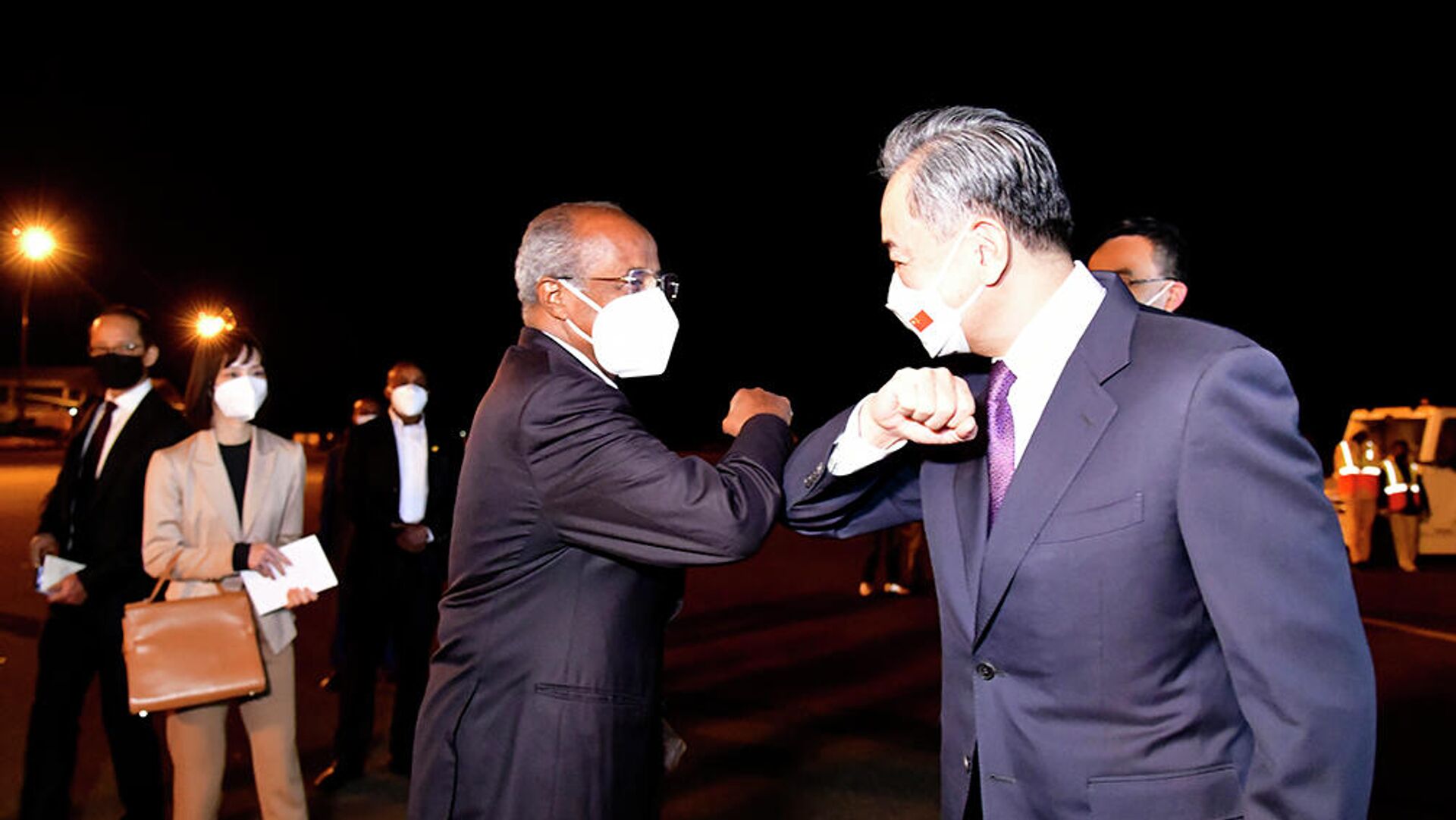Chinese FM Wang Tells Eritrea Beijing Opposes ‘External Interference’ in Africa Amid US Meddling
00:18 GMT 05.01.2022 (Updated: 11:35 GMT 23.11.2022)
Subscribe
Chinese State Councilor and Foreign Minister Wang Yi kicked off 2022 with a visit to three African nations, starting with Eritrea, a country declared a pariah by the United States, but which has recently joined the Belt and Road Initiative (BRI).
Wang arrived in Eritrea on Tuesday for a two-day official visit, meeting with Eritrean Foreign Minister Osman Saleh and other senior officials before meeting with Eritrean President Isiaias Afwerki. He will later continue to Kenya and then Comoros.
The Chinese foreign ministry gave no further details about Wang’s visit. However, friendship between the two nations has been deepening recently, and Beijing has also moved to strike a stark contrast between its policies toward Africa and those of the United States, which has accused China of meddling in African affairs and forcing nations into its orbit via so-called “debt trap diplomacy.”
China’s relationship with Eritrea goes back decades, with China supporting the Eritrean Liberation Front fighting for independence from Ethiopia, and even giving Isaias special training in 1967. However, it later dropped this support when Ethiopia switched its recognition from Taipei to Beijing in 1971. China was among the first to recognize Eritrea after independence in 1993, and has coordinated several projects, including building a hospital in Asmara and the furnishing of technical assistance in the health sector.
According to China Global Television journalist Shen Shiwei, Wang said China “firmly supports Eritrea in opposing external interference.”
“Regional countries know best the problems within the region and it's up to the people of a country to properly handle its internal affairs,” he added.
China's State Councilor & Foreign Minister Wang Yi arrived in Eritrea this evening for two-day official visit. FM Wang Yi & his delegation were received by FM Osman Saleh & other senior official at Asmara Int. Airport. Meetings scheduled with his counterpart & President Isaias pic.twitter.com/2VOKB86AzY
— Yemane G. Meskel (@hawelti) January 4, 2022
His comments come a month after visiting Addis Ababa, where he told Ethiopian Deputy Prime Minister and Foreign Minister Demeke Mekonnen that “China adheres to the principle of non-interference in internal affairs.”
“We do not meddle in the internal affairs of Ethiopia, and we also oppose any external forces' interference in the internal affairs of Ethiopia, and in particular disagree with the practice of some external forces to pressure Ethiopia for their own political purposes,” Wang said. He called for dialogue between the Ethiopian government and the Tigray People’s Liberation Front (TPLF), a rebel group designated a terrorist organization by the Ethiopian parliament that has waged a 13-month uprising aimed at reversing the loss of its longtime dominance of Ethiopian affairs. After a lengthy offensive into neighboring Afar and Amhara regions by the TPLF, the group was pushed back into Tigray late last year, and an uneasy stalemate has set it.
“Wang's visit will also contribute to peace building and conflict mediation for the region, and help the countries affected by the war solve their urgent problems," Liu Qinghai, a professor at the Institute of African Studies of Zhejiang Normal University, told the Global Times on Tuesday about his Eritrea visit.
His visit also comes as the US is putting heavy pressure on Somali President Mohamed Abdullahi Mohamed for having suspended his prime minister, Mohamed Hussein Roble, following accusations Roble had interfered in a corruption probe against himself. The US said Mohamed was attempting to subvert the democratic process Roble has been overseeing.
Eritrea was pulled into the conflict in Tigray just days after it began in November 2020, when in retaliation for giving shelter to Ethiopian government forces forced to retreat from Tigray, the TPLF launched ballistic missiles at the Eritrean capital of Asmara. The TPLF had separately waged a catastrophic war against Eritrea since 1998 that killed 120,000 people, but when Ethiopian Prime Minister Abiy Ahmed came to power in 2018, he quickly made peace with Eritrea, for which he was given a Nobel Peace Prize.
As Sputnik has reported, Washington’s support for the TPLF is largely motivated by the desire to punish Abiy for this misstep, which bridged an important gap in the region with a country the US has treated as a pariah state since it won independence from Ethiopia in 1991. The US sanctioned the Eritrean government, Isaias, and his top officials in November, accusing them of exacerbating the conflict in Ethiopia and threatening its territorial integrity.
By contrast, that same month, Eritrea also joined China’s BRI, a globe-spanning infrastructure megaproject. China has helped build highways, railroads, ports, power plants, and other structures of public use across Africa; nearby in the Horn, China has helped finance the Grand Ethiopian Renaissance Dam on the Blue Nile, a new railway from Addis to Djibouti, and several ports in Djibouti.
Like Djibouti, Eritrea sits on the African coast of the Red Sea, an important waterway through which more than 10% of global trade passes in a given year. However, unlike Djibouti, Eritrea has hungered for investment since independence and struggled to recover from the war with Ethiopia, including the loss of one-quarter of its productive land to landmines.


